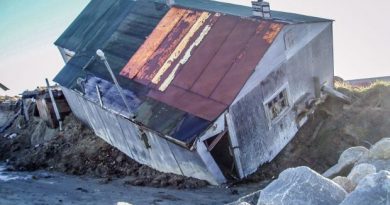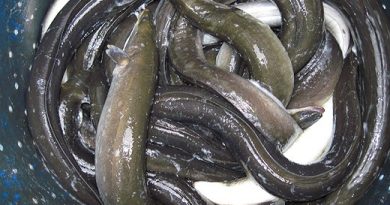Could salmon sharks be factor in declining Bering Sea king salmon numbers?

Given their name, it’s not surprising that salmon sharks eat salmon.
But Alaska researchers are now asking whether the animals might have any impact on declining numbers of Bering Sea king salmon.
Andy Seitz, assistant professor of fisheries at the University of Alaska School of Fisheries and Ocean Science, hopes preliminary research collected from tags he attached to the salmon might help answer that question.
“It’s too early to tell if salmon sharks have any impact on abundance on king salmon in the ocean, but it’s certainly another factor that should be investigated,” Seitz said in a phone interview from Fairbanks Wednesday.
Seitz has been using the “pop-up” tags in research for 15 years. The tags, which monitor depth, temperature and can estimate location, are designed to pop off the fish after a pre-determined length of time and float to the ocean surface. Seitz’s research started with bluefin tuna and moved to halibut 12 years ago. In 2012, with technology improving and the tags getting smaller, he tagged Dolly Varden in Northwest Alaska.
The success of that project prompted Seitz to try tagging king salmon.
More research needed
While there’s plenty of data on what salmon do in Alaska’s inland waters, much less is known about how the fish behave once they return to the ocean. In 2012, following a dire year of king salmon runs across Alaska, the state convened a group to look at king salmon research. Its conclusion was simple: More research is needed.
Seitz hopes his tagging method will contribute. He and his crew spent six weeks outside of Dutch Harbor trying to tag the salmon in December 2013 and 2014. Last summer, his crew took a Japanese research vessel to the central Bering Sea to catch more.
Since it’s difficult to catch the fish in the ocean — the small population is spread over a large area — it took a while to collect the test subjects using a net with a “live box” dragged behind the vessel that trapped the fish instead of killing them.
Seitz tagged 10 kings, and eventually got five tags back after they’d been attached to the fish for two to five months. Of those, Seitz noted two recorded temperature changes that indicate the kings were likely consumed by salmon sharks. Sharks regulate their body temperature to be slightly warmer than the ambient water temperature of the Bering Sea, which hovers between 40 and 55 degrees. The tags picked up temperatures of 65 to 80 — warm enough for a shark, but still colder than a marine mammal like a sea lion or whale that keeps its body temperature between 97 and 100 degrees.
How do sharks feed?
Temperature shifts also indicate how frequently the 300- to 500-pound sharks ate, data that with further investigation could give researchers a better idea of how often the sharks feed.
Seitz hopes to tag another 10 fish in the Bering Sea this summer to continue the research. He noted that the fish he tagged were larger fish that still had another year of life in the ocean before heading inland to spawn. Predation of those fish — there are fewer of them than younger kings — could mean that if the larger fish are being targeted by salmon sharks, it could have a larger proportional impact on the king salmon populations.
He noted that similar studies in the Atlantic Ocean have found other sharks preying on Atlantic salmon, which could be hindering that population’s recovery.
“(The research) points out the need to investigate salmon sharks for mortality in the ocean,” he said.
Related stories from around the North:
Canada: Is a fishing boom in the Arctic a sure thing?, Eye on the Arctic
Finland: EU drops seal-protection complaint against Finland, Yle News
Norway: Climate change will lead to ecosystem clash, Barents Observer
Sweden: Record numbers for Swedish wild salmon, Radio Sweden
Russia: Oryong 501 sinking highlights Arctic fishing, shipping issues, Blog by Mia Bennett
United States: Ice retreat threatening Bering Sea pollock, Alaska Dispatch



